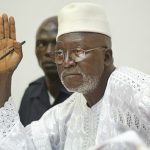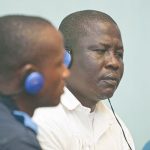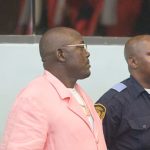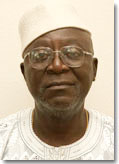 Sam Hinga Norman was born 1 January 1940 in Ngolala Village, Monghere, Valunia Chiefdom, in Bo District. He served in the Armed Forces from about 1959 to 1972, rising to the rank of captain. He graduated in 1966 from the Mons Officer Cadet School in Aldershot, UK. He served as Liaison Representative and Chiefdom Speaker of Valunia Chiefdom, Regent Chief of Jaiama Bongor Chiefdom, National Coordinator of the Civil Defence Forces militia, and Deputy Defence Minister of the Republic of Sierra Leone. At the time of his arrest he was Minister of internal Affairs of the Republic of Sierra Leone.
Sam Hinga Norman was born 1 January 1940 in Ngolala Village, Monghere, Valunia Chiefdom, in Bo District. He served in the Armed Forces from about 1959 to 1972, rising to the rank of captain. He graduated in 1966 from the Mons Officer Cadet School in Aldershot, UK. He served as Liaison Representative and Chiefdom Speaker of Valunia Chiefdom, Regent Chief of Jaiama Bongor Chiefdom, National Coordinator of the Civil Defence Forces militia, and Deputy Defence Minister of the Republic of Sierra Leone. At the time of his arrest he was Minister of internal Affairs of the Republic of Sierra Leone.
Norman died on 22 February 2007, before the delivery of the Trial Judgement. On 21 May 2007 the Trial Chamber terminated proceedings against him.
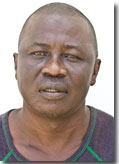 Moinina Fofana was born about 1950 in Nongoba Bullom Chiefdom, Bonthe District. At the time of his arrest he resided in Gbap and was Chiefdom Speaker of Nongoba Bullom Chiefdom. He served as Director of War for the Civil Defence Forces militia.
Moinina Fofana was born about 1950 in Nongoba Bullom Chiefdom, Bonthe District. At the time of his arrest he resided in Gbap and was Chiefdom Speaker of Nongoba Bullom Chiefdom. He served as Director of War for the Civil Defence Forces militia.
The Trial Chamber found Moinina Fofana guilty on Count 2 (murder, a war crime), Count 4 (cruel treatment, a war crime), Count 5 (pillage, a war crime), and Count 7 (collective punishments, a war crime). The Judges acquitted him on Count 1 (murder, a crime against humanity), Count 3 (inhumane acts, a crime against humanity), Count 6 (Acts of terrorism, a war crime), and Count 8 (conscription, enlistment or use of child soldiers, an other serious violation of international humanitarian law). The Trial Chamber sentenced him to a total of six years in prison.
The Appeals Chamber overturned his conviction on Count 7 (collective punishments), but entered new convictions on Count 1 (murder) and Count 3 (inhumane acts) after overturning the Trial Chamber’s ruling that the Prosecution had not proved the necessary elements to secure a conviction for crimes against humanity. The Appeals Chamber also increased his sentence to 15 years, after ruling that fighting on the side of the government could not be used as a factor in mitigating sentence.
He served his sentence at Mpanga Prison in Rwanda.
On 11 August 2014 the President of the RSCSL granted Fofana Conditional Early Release, but ordered that he serve six additional months in prison during which time he would undergo training so that he would understand the nature and seriousness of the crimes that he had committed, that he understood what may be a legitimate cause does not justify the use of illegal means, and that he acknowledged his own responsibility and the leadership role he played in the armed conflict in Sierra Leone.
On 12 March 2015 he was returned to Sierra Leone. He is serving the balance of his sentence in Bo, subject to strict conditions and stringent monitoring.
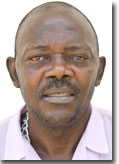 Allieu Kondewa is believed to have been born in Bo District. At the time of his arrest he lived in Bumpe Chiefdom, where he worked as a farmer and herbalist. He served as Initiator and High Priest for the Civil Defence Forces militia.
Allieu Kondewa is believed to have been born in Bo District. At the time of his arrest he lived in Bumpe Chiefdom, where he worked as a farmer and herbalist. He served as Initiator and High Priest for the Civil Defence Forces militia.
The Trial Chamber found Allieu Kondewa guilty on Count 2 (murder, a war crime), Count 4 (cruel treatment, a war crime), Count 5 (pillage, a war crime), Count 7 (collective punishments, a war crime), and Count 8 (conscription, enlistment or use of child soldiers, an other serious violation of international humanitarian law). The Judges acquitted him on Count 1 (murder, a crime against humanity), Count 3 (inhumane acts, a crime against humanity) and Count 6 (Acts of terrorism, a war crime)
The Appeals Chamber overturned his conviction on Count 7 (collective punishments), and Count 8 (child soldiers), but entered new convictions on Count 1 (murder, a crime against humanity) and Count 3 (inhumane acts, a crime against humanity) after overturning the Trial Chamber’s ruling that the Prosecution had not proved the necessary elements to secure a conviction for crimes against humanity. The Appeals Chamber also increased his sentence to 20 years, after ruling that fighting on the side of the government could not be used as a factor in mitigating sentence.
He is serving his sentence at Mpanga Prison in Rwanda.
Background
On 7 March 2003, the Trial Chamber approved an eight-count indictment against Sam Hinga Norman. On 28 May 2003, the Court ordered Moinina Fofana and Allieu Kondewa to be arrested and provisionally detained. The Court approved indictments against Fofana and Kondewa on 26 June 2003.
On 28 February 2004, the Trial Chamber ordered that Norman, Fofana and Kondewa be tried jointly, and approved a consolidated indictment.
On 3 June 2004, the trial opened before Trial Chamber I in Freetown. Following the Prosecution opening statement, Norman announced that he was dismissing his legal team and that he would represent himself. On 8 June 2004 the Trial Chamber granted Norman leave to represent himself, but with the assistance of standby counsel.
The Prosecution Case
The Prosecution made their opening statement on 3 June 2004, followed on 15 June 2004 by Norman’s opening statement and the first Prosecution witness. The Prosecution concluded its case on 14 July 2005 after calling 75 witnesses, 3 of them experts.
Motions for Judgement of Acquittal
All three accused filed Motions for Judgement of Acquittal under Rule 98, arguing that the Prosecution had failed to bring evidence “capable of supporting a conviction on one or more counts of the indictment.” On 21 October 2005, the Trial Chamber dismissed the motions in respect of one or more counts in the indictment, but found that the Prosecution had not produced evidence capable of supporting a conviction for several counts in respect of a number of specified locations charged in the indictment.
The Defence Case
The Defence opened its case on 19 January 2006, with opening statements for Fofana and Kondewa (Norman made his opening statement at the opening of the Prosecution case). On 24 January 2006 Sam Hinga Norman took the stand to testify on his own behalf (Fofana and Kondewa did not testify). The Defence concluded its case on 18 October 2006 after calling 44 witnesses.
The Death of Norman
On 22 February 2007, after the end of witness testimony but before judgement, Sam Hinga Norman died in Dakar, Senegal, where he had gone for hip replacement surgery. On 21 May 2007 the Trial Chamber terminated proceedings against Norman. An autopsy showed that Norman had died of a myocardial infarction (heart attack) unrelated to his hip replacement surgery, and a subsequent investigation ordered by the President of the Special Court concluded that he had received proper care during the entire time he was in Special Court custody. On 21 May 2007 the Trial Chamber terminated proceedings against him.
Trial Judgement
On 2 August 2007 the Trial Chamber, by a majority, found Fofana guilty on Counts 2, 4, 5 and 7. Kondewa was found guilty on Counts 2, 4, 5, 7 and 8. The Trial Chamber ruled that the Prosecution had not proved the necessary elements to convict on crimes against humanity, and did not enter convictions on these counts.
Sentencing Judgement
The Trial Chamber, by a majority (Justice Thompson declining to participate), sentenced Fofana and Kondewa on each of the counts for which they were found guilty, to be served concurrently. The Court sentenced Fofana to a total of six years, and Kondewa to a total of eight years.
Appeal Judgement
The Appeals Chamber, by a majority, overturned Kondewa’s conviction on Count 8 (enlistment of child soldiers, and convictions for both Fofana and Kondewa on Count 7 (collective punishments). The Judges, by a majority, entered new convictions on Counts 1 and 3 after overturning the Trial Chamber’s ruling that the Prosecution had failed to prove the necessary elements of crimes against humanity. The majority sustained convictions on Counts 2 and 4, and increased the sentences after ruling that fighting on the side of the government could not be used as a factor in mitigation of sentence. The Appeals Chamber sentenced Fofana 15 years and Kondewa to 20 years.

